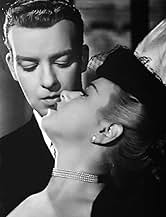Aggiungi una trama nella tua linguaA provincial woman arrives in the city in love with a young novelist whom she betrays.A provincial woman arrives in the city in love with a young novelist whom she betrays.A provincial woman arrives in the city in love with a young novelist whom she betrays.
Trama
Lo sapevi?
- ConnessioniReferenced in Snuff (1975)
Recensione in evidenza
It's very interesting how movies capture history in a way that no literary work can possibly do. This movie, for example, done in 1948 with Buenos Aires locations, is a fantastic document to show us a city that doesn't exist any longer under those premises: Street life, people's garments, even the way they walked!! Policemen directing traffic, famous cabarets that no longer exist, night life of prosperous economic times now gone with the wind... For that experience I highly recommend this movie (specially for porteños --people born in Buenos Aires--) as a curio to have a peep at the way our ancestors used to live their lives, but not for much more.
As a movie it is quite disappointing. I just saw it on You Tube and the copy offered is terrible, the images quite blurred and the sound almost gone in some places (Spanish is my mother tongue and yet I was straining my ears on the spoken words, sometimes almost undecipherable, like a radio station out of range).
That to start with, didn't make the watching enjoyable, but the script was perfectly understandable and very disappointing, since starting with a fascinating premise ("My Cousin Rachel" type of story in modern times), it disintegrates quite soon showing very early something that should have been hidden from the viewer for the longest possible time (the heroine morality). That discovery so early on spoils the whole picture.
Olga Zubarry's character is drawn with very broad strokes, and Roberto Escalada's character, tortured by jealousy, is similarly depicted. The --supposedly-- smoldering love scenes must have been quite shocking then, but nowadays those two look like nursery children playing adults. Very crude script, almost amateurish.
And culturally it seems that well bread women at that time were supposed to speak in a thin and fluty, whining, complaining way that one must assume macho men of that time found "respectable" and irresistible, while nowadays they sound pitiful and almost laughable.
The end of the movie is so abrupt with an amateurishly hand written "FIN" (The End) plastered on, that I thought they forgot the last reel and ended it there for good (one can imagine what follows, but it doesn't make a good ending as is).
There is an inconceivable mistake when (SPOILER AHEAD) we see her lover's apartment building (still in the same location today!), a very identifiable corner building and towards the end of the film, they show THE SAME BUILDING as Olga Zubarry's character apartment, and the same floor and door number!!! Really... were there no other buildings in Buenos Aires to photograph?? Maybe they shared as roommates the same apartment because in that upper class neighborhood the rent was too expensive??
Only to be seen by the stout of heart nostalgics (and then, only stout of heart porteños).
As a movie it is quite disappointing. I just saw it on You Tube and the copy offered is terrible, the images quite blurred and the sound almost gone in some places (Spanish is my mother tongue and yet I was straining my ears on the spoken words, sometimes almost undecipherable, like a radio station out of range).
That to start with, didn't make the watching enjoyable, but the script was perfectly understandable and very disappointing, since starting with a fascinating premise ("My Cousin Rachel" type of story in modern times), it disintegrates quite soon showing very early something that should have been hidden from the viewer for the longest possible time (the heroine morality). That discovery so early on spoils the whole picture.
Olga Zubarry's character is drawn with very broad strokes, and Roberto Escalada's character, tortured by jealousy, is similarly depicted. The --supposedly-- smoldering love scenes must have been quite shocking then, but nowadays those two look like nursery children playing adults. Very crude script, almost amateurish.
And culturally it seems that well bread women at that time were supposed to speak in a thin and fluty, whining, complaining way that one must assume macho men of that time found "respectable" and irresistible, while nowadays they sound pitiful and almost laughable.
The end of the movie is so abrupt with an amateurishly hand written "FIN" (The End) plastered on, that I thought they forgot the last reel and ended it there for good (one can imagine what follows, but it doesn't make a good ending as is).
There is an inconceivable mistake when (SPOILER AHEAD) we see her lover's apartment building (still in the same location today!), a very identifiable corner building and towards the end of the film, they show THE SAME BUILDING as Olga Zubarry's character apartment, and the same floor and door number!!! Really... were there no other buildings in Buenos Aires to photograph?? Maybe they shared as roommates the same apartment because in that upper class neighborhood the rent was too expensive??
Only to be seen by the stout of heart nostalgics (and then, only stout of heart porteños).
- davidtraversa-1
- 18 lug 2011
- Permalink
I più visti
Accedi per valutare e creare un elenco di titoli salvati per ottenere consigli personalizzati
Dettagli
- Tempo di esecuzione1 ora 20 minuti
- Colore
- Mix di suoni
- Proporzioni
- 1.37 : 1
Contribuisci a questa pagina
Suggerisci una modifica o aggiungi i contenuti mancanti

Divario superiore
By what name was Los pulpos (1948) officially released in Canada in English?
Rispondi



















